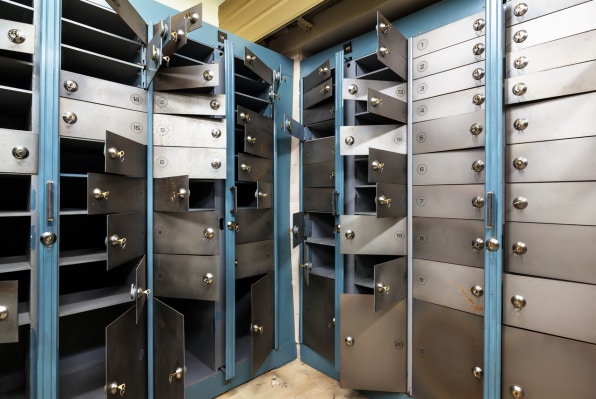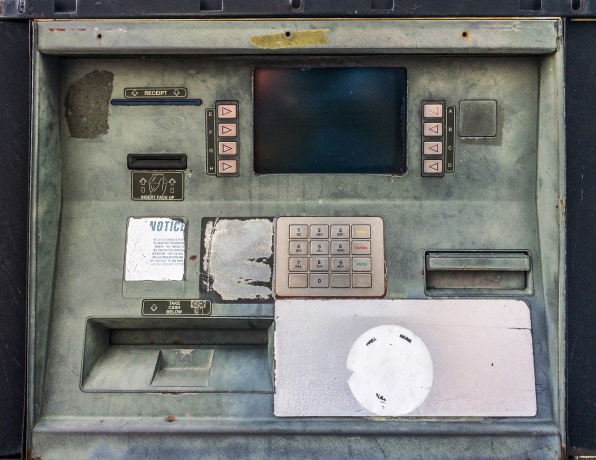Can You Take Savings Money Out Of Bamnk
Autonomously from the familial ties that I was built-in into, my relationship with Wells Fargo may accept been one of the longest-continuing of my life. Since I was 11 years old, I've had a savings account with the banking concern, linked to my parents' finances. I don't remember how onetime I was when I opened my first checking business relationship, but I assume I was in high school. When I moved to New York three years ago, I prepare up my first credit menu in a Wells Fargo branch role and felt very adult and too concerned most the streak of financial irresponsibility the new plastic might unleash in me. What company I banked with felt every bit inevitable as the family I was born into and the country in which I grew up. Putting my Wells card downwards on the table at dinner, I ofttimes felt a bizarre affection for how it identified me as a Californian.
But despite that sentimentality, Wells and I have parted ways. The decision was mine, and the idea to make it began to percolate earlier this year, as allegations of the bank's financial investment in the Dakota Access Pipeline began to come out. That California-based sentimentality over my account had morphed into something more resembling nausea, knowing my money was funding something I didn't believe in. But all the same, it's taken me until now (longer than it took the unabridged city of Seattle) to brand a switch.
After I decided I wanted to pull my money from Wells, I had to confront the fact that I had no idea what I was doing. How would I go almost finding a new bank I could trust? When should I move my money, and how? It took a series of conversations and months of thought and training, simply I'm sharing what I learned here to go far clear that information technology's not every bit overwhelming as information technology seems.

Do Y'all Believe In Your Bank?
Where y'all bank is non blighted; it'south a personal pick. Or rather, it should exist, only the same forces of apathy, ignorance, trepidation, and laziness that were preventing me from taking my finances out of an institution with which I ethically disagreed prevent too many others from doing the aforementioned. When you've frequented the aforementioned ATMs and logged into the same online banking concern account for the majority of your life, a move away from that institution can feel rather like stepping off the edge of a cliff.
Simply it'south a cliff that's proving increasingly intriguing for many young Americans, who have been losing faith in our large financial institutions. Wells Fargo is not lone in finding itself at the center of a scandal: In 2015, Citibank was ordered to pay back its customers a total of $700 million for misleading credit card marketing; Jamie Dimon, the CEO of JPMorgan Chase, is still at the captain of the company despite knowing of and ignoring to Bernie Madoff's $64 billion Ponzi scheme, largely run through JPMorgan Hunt business relationship and considered the most fraudulent financial scheme of all time. Both institutions, forth with Bank of America and Wells Fargo, were the engines that both created and punctured the housing chimera that precipitated the financial crisis of 2008. Every bit Robert Jackson Jr., a police force professor at Columbia Academy, told Quartz, "there's no such thing as a 'good' big bank later the financial crisis."
"Generally and broadly, there's a lack of trust amid millennials in the financial industry, and it's deserved," Ariel Anderson, a financial planner at Society of Grownups, a personal finance organization aimed at young people, tells Fast Visitor. "We constantly read headlines about the missteps of banks like Wells Fargo; we lived through the financial crunch," she says. And large financial institutions are representative of the capitalist system, which, as Fast Company has reported, has fallen out of favor with more than 51% of the millennial demographic.
Various organizations have tapped into this tendency: In 2011, during the acme of the Occupy Wall Street motility, a group of organizers designated Nov 5th as Bank Transfer Day, and encouraged consumers to movement their money into nonprofit credit unions or ethical financial institutions. This past yr, Dark-green America suggested that people funnel their Valentine'southward Day discomfort into a breakup with their large banking concern. (Though there are no estimates equally to how many people participated, Bank Transfer Twenty-four hour period drew effectually fifty,000 members to their Facebook folio). Both organizations emphasized, even so, that starting the process should non exist confined to these designated days: You should begin to move your coin whenever you feel ready and able to do so.
And then that being said, here'southward what I've learned from making the switch out of a big bank:

Practise Your Research
Given that I parted ways will Wells Fargo over an ethical quandary, I wanted to notice a new platform that wouldn't compromise my values. Customs Evolution Financial Institution (CDFI) banks and credit unions, generally, target their investments more toward local investments and causes, rather than destructive projects like DAPL. Credit unions are highly localized, member-owned nonprofits that provide financial services to the communities in which they operate; CDFIs are private, for-profit institutions that brand loans to underserved communities (read more than most them here). The Harbor Bank of Maryland, for instance, recently made a loan to East Baltimore Development Inc. that has gone toward financing new science buildings for local schools. The Opportunity Finance Network, an umbrella system for CDFIs, has a helpful search tool to apply to locate nearby community development banks.
Ethical banks like Aspiration in the U.S. and Triodos in Europe, both of which boast sustainable and fossil-fuel-free investment portfolios, are another alternative. Though less hyperlocal than CDFI banks and credit unions, ethical banks are driven past skilful–Aspiration, for instance, devotes 10% of its revenue to charity, and charges customers only what they feel is fair to pay–and aim for institution-wide transparency to annul the labyrinthine structures of big banks.
For the sake of disclosure, subsequently a long and thorough search process, I opened an Aspiration account. Bound Bank, a New York-based CDFI, was a shut contender, but another thing to consider about banking with a CDFI is that you lot ought to be firmly settled in your community to practise so–I even so take strong ties to the Due west Declension as well equally New York, then I wanted a bank that would offering me more flexibility in terms of location (Aspiration is all online). Only give me a few more years to become a a rooted New Yorker, and experienced bank switcher, and I can run across myself opening some other account with Leap Bank. Both Aspiration and Spring represent another bonus of ethical banking: They reimburse all ATM fees.

Make Some (Very Careful) Moves
One time yous've analyzed your options and selected a new account that aligns with your ethics, now'south the fourth dimension for the tricky role: Really moving your coin. This is best done very slowly (the whole process took me near two months). I talked to Andrei Cherny, CEO of Aspiration, after I decided to open an account with them, for some tips; hither's what he recommended.
If you have more than than one account open with your big bank–I had ii checking accounts and a savings business relationship–consolidate your money into one account, then alert your bank that you will exist closing the others. I communicated with Wells Fargo through e-mail, which was surprisingly simple, merely you tin as well visit a physical branch and see with a representative who volition walk you through the procedure. Then, open your new account–I transferred just $500 to begin with, and virtually banks will suggest a minimum eolith–and if y'all've been receiving direct deposits from your employer, talk to your Hour representative to get a new form to route your checks into your new business relationship. I recommend doing so immediately after receiving a paycheck, so there will be plenty fourth dimension in between checks to link the new account. For me, information technology took less than ii weeks.
While yous're waiting for your new card to arrive in the postal service, go through last month's banking company argument from your old account to identify and abolish automatic payments and recurring transfers (some examples: the corporeality I regularly moved into my savings account with each paycheck; my Optimum bill; my monthly Netflix payment). And then, become through your payments systems, like Venmo and Apple Pay, and brand sure those are linked to your new account or bill of fare, when information technology arrives.
When it does, you can practise a big transfer from your old account to your new one. To do and so, you'll need to link your old account with your new 1. On your new bank's website, observe the "bank transfer" section, select your old banking concern from a list (you'll see all the large ones–Wells, Banking concern Of America, Citi, and so on), and sign in. You'll and then select whatever account you want to link, and how much money to move to your new bank.
It'south best to go on some money in your former account if yous've missed any automatic payments–y'all don't want to be hit with an overdraft fee while you're trying to financially liberate yourself. And information technology's too best to keep that old account open with a small corporeality of cash in it for a couple of months subsequently migrating, just in example of emergencies.

While You're At It, Face Down Your Finances
I expected to experience good about putting my coin into an account that I chose, and I do. But the unexpected benefit to this whole, long process, was the opportunity to become upwardly close and personal with my finances. In addition to a distrust of big financial institutions, JJ Ackles, the director of marketing for Long Game, a prize-linked savings account app, tells Fast Visitor that young people tend to get trapped in an avoidance cycle when it comes to their money. "It'south similar: I feel shitty about my money, therefore I don't want to look at it, therefore I don't wait at it, therefore I feel shitty nearly information technology," Ackles says.
When you move all your money to a new business relationship, y'all have to look at it. And that opens the door to considering new ways to handle it. At that place are apps like Long Game, which reward every fourth dimension you move money into your savings business relationship with the opportunity to play addicting, lottery-like games and potentially win more than coin; other savings platforms like Digit help yous set upward specific savings goals.
And it's also, says Erin Lowry, blogger and author of Broke Millennial, not a bad time to consider investing, if you haven't done then already. Though the financial industry has a history of making investing into an opaque effort, available only to those with substantial monetary worth and knowledge, that's really not the example. New tools now be that both lower the financial bar to investing, and make it easier to tailor your investments to support causes you care nearly. Aspiration, for example, manages two funds with a $100 minimum investment, both of which support but companies with solid environmental and ethical commitments. The startup OpenInvest has a $3,000 minimum investment, merely takes the unique approach of asking you what you care about, whether it be climate change or depression-income housing development, and builds out a portfolio unique to you. (Fast Company has done a thorough roundup of what you need to know to invest to fit your values.)
Taking your money out of a banking concern with which you disharmonism ethically frees you to use your money to have the kind of bear upon yous want on your life and on the planet. "People are looking for better tools and better ways to manage their money," Ackles says. "We want to create a fashion for people to have a positive interaction with their coin."
And taking that step, Lowry says, volition brainstorm to put pressure on the big banks to reconsider their own ethics. "We demand to brainwash ourselves and we demand to terminate putting our coin in institutions that we feel are unethical," Lowry says. "So many people don't even bother to do the diligence and but stick with the status quo. That makes it easier for the old banks who accept non changed their policies to deport in the way they have always washed, just because they can."
Source: https://www.fastcompany.com/40446765/how-to-pull-your-money-out-of-a-big-bank-its-not-that-hard-i-just-did-it
Posted by: luptontiloot.blogspot.com

0 Response to "Can You Take Savings Money Out Of Bamnk"
Post a Comment